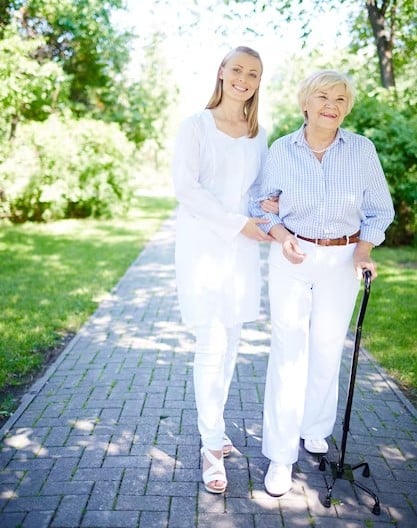Knee pain and discomfort are generally par for the course as we age. Various factors, such as gravity, time, and extensive use, contribute to knee pain. Compound this with age from many years of built-up strain and impact. By the time seniors reach old age, their knees have experienced a great deal of wear and tear, making them more vulnerable to pain and injury.
Contributors to Knee Pain
In addition to the general deterioration of the knees, which occurs over many years, some other conditions and factors can contribute to causing occasional or persistent knee pain for seniors. These can include, but are not limited to:
- Trauma or Injury
- Mechanical issues
- Obesity
- History of heavy usage
- Lack of strength and flexibility
- Osteoarthritis
Trauma or Injury
Recurring injury or intense trauma to the knee joint can result in lingering pain and anguish.
Some injuries that can result in knee pain later in life include the following:
- ACL tear – ACL is one of 4 ligaments that help keep your knee joint connected and stabilized
- Meniscus tear – Meniscus is tough cartilage responsible for shock absorption
- Bursitis – Inflammation resulting in swelling and fluid retention in the knee joint
- Patellar tendonitis – Inflammation of tendons in the knee that attach muscle to bone
- Fractures – Broken bones in the knee joint are often the result of falls or car accidents
Mechanical Issues
Mechanical problems with the knee joint may result from injury, poor posture, or a sedentary lifestyle. Mechanical knee issues include the following:
- Dislocation – When the patella bone slides out of place due to awkward twisting or uneven weight placement
- Loose joint – The knee joint can become feeble after a dislocation or cartilage damage
- IT Band Syndrome – Tightness in the iliotibial band (IT), which runs along the outside of the knee from the hip to the shin bone
- Hip or Foot pain – Overcompensation for hip or foot issues can affect gait and put undue stress on the knee joint
Obesity
Excess weight places increased stress and strain on the knee joint. Even low-impact activities like walking will cause accelerated deterioration of the knees in obese individuals.
History of Heavy Usage
People who have played sports or worked jobs requiring frequent standing, kneeling, and bending are at an increased risk for knee pain when they get older—sports like skiing, basketball, and running place particular stress on the knee joint.
Lack of Strength and Flexibility
Strong knee muscles help stabilize the joint and protect it from injury. Regular stretching exercises also help promote a good range of motion to give the joint better mobility.
Osteoarthritis
The most common type of arthritis in seniors, osteoarthritis, is a degenerative disease characterized by cartilage breakdown, putting extra strain on the knee joint.

Alleviating Knee Pain
You can implement various strategies to help manage or relieve knee pain that seniors may experience. The most effective approach for relief is typically dependent on personal circumstances, lifestyle, and current state of health.
Some seniors will likely have to opt for surgery in the form of a knee replacement, a procedure to remove damaged bone and cartilage and replace it with a synthetic joint. Others will not need surgery and can alleviate or manage pain through physical therapy or prescribed painkillers.
Consulting with a healthcare professional is always the best strategy, so make an appointment with a doctor whenever pain begins to cause concern or interfere with daily life.
Healthy Choices
Making healthy lifestyle choices is advantageous to overall health, and our knees can benefit from positive behavioural changes that can help reduce pain. Healthy weight loss for seniors who are overweight can help improve mobility and reduce knee pain. Lessening the weight that knees have to carry around can ease their load and, as a result, alleviate some pain. Knees can also benefit from strengthening through exercise to help make them more resilient and flexible, thus reducing pain intensity.
Knee pain can be distressing, uncomfortable, and discouraging when it starts to limit mobility, but there are ways to care for our knees that can help manage daily symptoms. Focusing on healthy practices for specific body areas, like the knees, can help improve overall health and well-being.
Companion Care
For our senior loved ones living at home, Promyse Home Care offers Companion Care to accompany them on outings and gentle walks to keep them moving safely.
As part of our special in-home assessment, our Nurse Case Managers will identify care goals and select a companion for you or your loved one to develop a long-lasting, meaningful relationship with.



